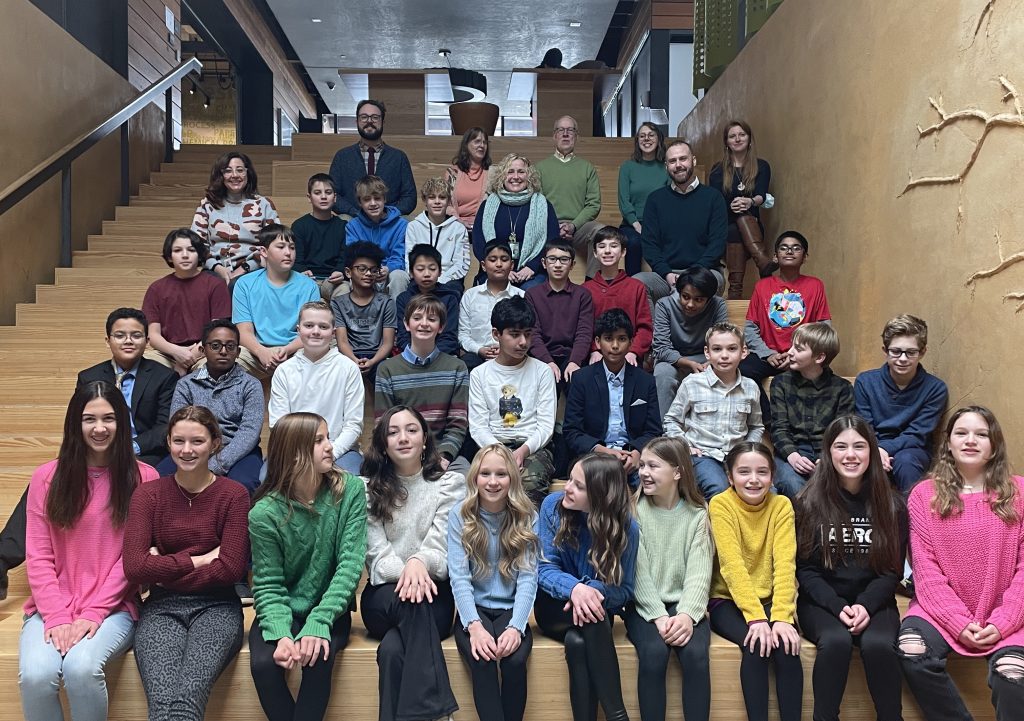
Architectural Design Challenge Helps Sixth Graders Imagine Reuse of Historic House

Thirty-one gifted sixth-grade students from Pine-Richland School District’s Eden Hall Upper Elementary School presented design concepts for repurposing a 111-year-old house on the Eden Hall campus of Chatham University, on January 27.
The presentations were part of our Architectural Design Challenge, a component of our educational program to help young people imagine how to relate to our city and region’s architecture, and historic preservation of the built environment. As it has been in previous years, the Challenge site was the Morledge House—a roughly 1800-square-foot house and garage with a Dutch gambrel roof, located on the Eden Hall Campus.
This year, Pine-Richland teachers Joanna Sovek and Jennifer Kopach proposed a substantial change in the program. Instead of designing for whatever use suited their fancy, student teams would now work for a client that had specific programmatic requirements.
“The State of Pennsylvania’s academic standards include a career awareness component for our kids. We thought this program could provide a great opportunity to give students direct experience working in a creative, collaborative way that requires them to solve particular architectural problems,” said Ms. Sovek and Ms. Kopach.
The teachers’ idea meshed perfectly with the conditions on the Eden Hall Campus, which has been a valued partner since we created the program in 2015.
Kelly Henderson, K-12 education coordinator at Eden Hall, canvased colleagues there about the unfilled facilities needs in their departments. Together, they came up with three possible architectural programs for the eight student teams to wrangle out of the Morledge House:
- A recreational center where students could relax—whether passively, by simply “chilling,” or actively, through outdoor or indoor diversions.
- A bike shop, at which the campus’s bikes would be stored, rented, and repaired and where students could learn to fix bicycles.
- A space to support the farm team, which grows food that is used on campus and conducts research on agricultural sustainability.
Student teams met with the clients during the program to learn about what they needed or wanted, and to ensure that they were being responsive to the clients.
To make the Challenge even more realistic, students assumed specific roles that would be found on an architectural project with this scope and goals: LEED-certified architect, preservationist, landscape designer, interior designer, drafter/digital modeler, and project manager.
Students presented their projects to a panel of four architects (Ray Bowman, Nicole Cicconi, Paul Tellers, and Rob Zoelle) and two of the clients. Awards were presented in several categories that recognized the varied skills needed for complex architectural projects. The panel gave the award for Best Project Overall to the team calling itself Apex Architecture Firm, for “The Bike Barn.”
Inspired by the “casual-meets-elegant” aesthetic of so-called Wedding Barns, it maintained the building form and reinforced the structure to accommodate heavier loads; used reclaimed wood for storage furniture and other furnishings; and proposed use of a pulley system to move heavy boxes to the attic-level storage. Dr. Mary Whitney, Sustainability Director for Chatham University and the client for the bike shop program, was impressed by the team’s responsiveness to her feedback on its initial design. “I felt very heard: they really listened to what I told them!”
Ms. Kopach and Ms. Sovek were “beyond proud” of their students for the sophistication of their design solutions and the maturity with which the teams made their well-practiced presentations. By way of closing remarks, juror Paul Tellers, a PHLF docent and practicing architect, told the students that the problem-solving process they experienced through this program would serve them well in the future.
“Working together, learning to compromise, responding to specific needs, communicating your ideas—you need to be good at all these things, regardless of what you do later in life,” he said.
In addition, learning about historic preservation and sustainability are the big lessons to be gleaned from this Architectural Design Challenge.
